Quality Assurance Department / International Quality Certification
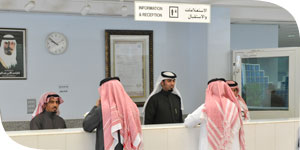
In an extensive audit in March 2009 a BSI external audit team renewed the hospital's certification for ISO 9001:2008 Quality Management System and granted 3 new certifications for:
- PAS 99:2006 (Integrated Management System)
- ISO 14001:2004 (Environment Management System)
- OHSAS 18001:2007 (Occupational Health and Safety)
KJOH is the first hospital in the world to achieve certification in PAS 99.
The Quality Assurance Department comprises Internal Quality Audit, Quality Improvement, Infection Control Surveillance, Customer Perception, as well as Environmental Management, and Occupational Health and Safety functions.
The QA Department monitors all functions in KJO Hospital to ensure and improve quality of service delivery.
Training and Development Centre / Life Support Training Centre
A new Training and Development Centre was opened in 2009. The new centre accommodates all life support programs, and training and development activities for the whole hospital.
The current Major Training Programs are:
- BCLS and ACLS Provider Courses (Saudi and American Heart Association accredited)
- Heart Saver Courses (English and Arabic)
- BCLS and ACLS Instructor Courses
- Manual Handling and Ergonomics Program
- Intravenous Therapy (Saudi Council recognized)
- International Conferences (Saudi Council recognized)
- Khafji Medical Forum (Saudi Council recognized)
- Continuing Nursing Education (including Case Studies)
- Weekly Continuing Medical Education (Saudi Council recognized)
- Quality Awareness training (EMS, OHSAS, Infection Control)
- Departmental Training
- Leadership Development
- DM/ERP Drills
- Community Outreach Programs and International Health Events
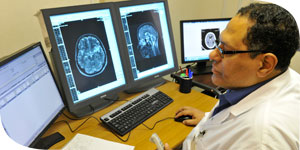
Clinical Laboratory Department
The Clinical Lab Department is a state-of-the-art laboratory designed to meet the demands of the hospital's inpatients and outpatients. Most tests are done "in-house". Diagnostic sections include Haematology, Blood Bank, Microbiology, Clinical and Special Chemistry, Serology and Parasitological Services.
Participation in an internationally accredited External Quality Control Program ensures the accuracy and reliability of all diagnostic tests performed.
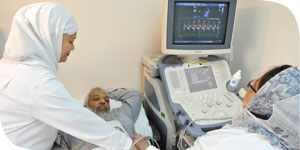
Medical Imaging Department
Services offered by the Medical Imaging Department include:
1. Digital Radiography - This is the most current technology available to reduce radiation exposure for both staff and patients, and provides optimum image quality.
2. Digital Fluoroscopy for special procedures.
3. Computed Radiography for converting analog images into high-quality digital images.
4. PACS - Picture Archiving and Communication System for electronic access to any image anywhere in the hospital. This system also digitally archives images for retrieval at any time.
5. Ultrasound examination for abdomen, pelvis, obstetric and muscolosketal studies.
6. Colour Doppler ultrasound for the arterial and venous systems of the body e.g. arteriosclerosis, DVT and varicose veins.
7. 6 Multi-slice Helical Computed Tomography (CT) scanning with 3D reconstruction capabilities, bone densitometry, etc.
8. .23Tesla open MRI for neurological and musculoskeletal imaging.
9. Mammography.
10. Portable X-ray.
Work in the MID department extends for 24 hours/day to cover ICU, Emergency Department and trauma patients.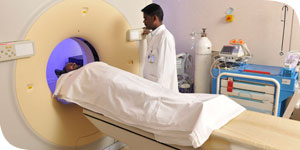
Intensive Care (ICU) and Neonatal Intensive Care (NICU) Units
Two of the most important divisions of the hospital are the Intensive Care and Neonatal Intensive Care Units. These units take care of the most serious and often life-threatening cases with a highly trained and specialized nursing team.
In early 2005 the Intensive Care Unit (ICU) was provided with advanced technical equipment in order to upgrade the medical services and provide up to 21 electronic beds and the latest models of essential life support and physiologic monitoring equipment.
Both the ICU and NICU Teams include full-time Intensivist and Neonatal Intensivist coverage.
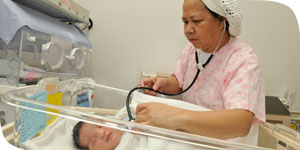
Haemodialysis Unit
The Haemodialysis Unit contains updated haemodialysis machines (Fresenius 4008) guaranteeing safety and efficiency of all important treatment modalities within scope of renal replacement therapies such as:
- Bicarbonate or acetate dialysis
- Ultrafiltration and sodium profiles
- Isolated ultrafiltration
Social Worker, dietary and patient educational support is multidisciplinary.
The Haemodialysis Unit is on standby for emergency cases 24 hours per day and has links with the Saudi Centre of Organ Transplantation (SCOT) to prepare patients for kidney transplantation.
Multidisciplinary Diabetic Centre
In 2009 the Diabetic Centre was opened. This centre is staffed by specialist physician, specially trained nurses and a dietician. The goals of the Centre are:
- Prevention of Type 2 Diabetes Mellitus (DM)
- Identification of patients with Type 2 DM
- Detection of acute and long term complications of DM
- Effective clinical management of diabetic patients
- Diabetic Education programs for all patients receiving care
- Statistical analysis of patient outcomes
Algorithms of the referral and patient care processes covering all involved specialties are followed and the Centre received over 1000 patient visits in its first year of operation.

Women's Health Clinic
A Women's Health Clinic was opened in May 2009. The clinic involves the Obstetrics and Gynaecology and Medical Imaging Departments. The scope of service includes:
- Breast screening
- Screening for cervical cancer
- Osteoporosis screening
- Contraception counselling / Family Planning
- Pre-conception counselling
- Menopausal counselling
- Psychiatric and Social Services intervention
- Sexual dysfunction
Smoking Cessation Clinic
The Smoking Cessation clinic started its activities in December 2006 in order to combat smoking which was proved to be a significant risk factor for ischemic heart disease, lung diseases, cerebral stroke and malignancy.
The activity of the clinic includes prophylactic and therapeutic practices. Prophylactic activity includes increasing awareness of the population about hazards of smoking and its close relation to serious diseases through lectures for the population, the distribution of educational handouts and brochures, visits to schools and work places in addition to media publicity such as newspapers.
Therapeutic activities include medications such as nicotine patches and the silver spike machine, in addition, to social support and follow-up.
